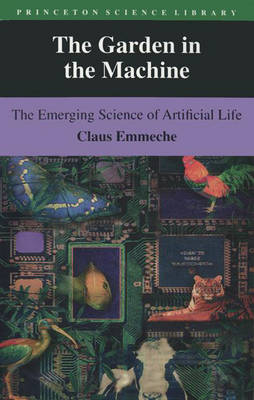
The Garden in the Machine
The Emerging Science of Artificial Life
Seiten
1994
Princeton University Press (Verlag)
978-0-691-03330-3 (ISBN)
Princeton University Press (Verlag)
978-0-691-03330-3 (ISBN)
- Titel ist leider vergriffen;
keine Neuauflage - Artikel merken
In this wide-ranging survey, Claus Emmeche outlines many of the challenges and controversies involved in the dynamic and curious science of artificial life. He describes work being done by an international group of scientists who are using computers to study simulated life conditions.
In this wide-ranging survey, Claus Emmeche outlines many of the challenges and controversies involved in the dynamic and curious science of artificial life. He describes the work being done by an international network of biologists, computer scientists and physicists who are using computers to study life as it could be, or as it might evolve under conditions different from those on Earth. Many artificial-life researchers believe that they can create new life in the computer by simulating the processes observed in traditional, biological life-forms. The flight of a flock of birds, for example, can be reproduced faithfully and in all its complexity by a relatively simple computer program that is designed to generate electronic "boids". Are these "boids" then alive? The central problem, Emmeche notes, lies in defining the salient differences between biological life and computer simulations of its processes. His study touches on every aspect of this complex and rapidly developing discipline, including its connections to artificial intelligence, chaos theory, computational theory, and studies of emergence.
In this wide-ranging survey, Claus Emmeche outlines many of the challenges and controversies involved in the dynamic and curious science of artificial life. He describes the work being done by an international network of biologists, computer scientists and physicists who are using computers to study life as it could be, or as it might evolve under conditions different from those on Earth. Many artificial-life researchers believe that they can create new life in the computer by simulating the processes observed in traditional, biological life-forms. The flight of a flock of birds, for example, can be reproduced faithfully and in all its complexity by a relatively simple computer program that is designed to generate electronic "boids". Are these "boids" then alive? The central problem, Emmeche notes, lies in defining the salient differences between biological life and computer simulations of its processes. His study touches on every aspect of this complex and rapidly developing discipline, including its connections to artificial intelligence, chaos theory, computational theory, and studies of emergence.
Claus Emmeche, a Danish theoretical biologist, is a Research Fellow at the Center of Cognitive Science, University of Roskilde. He is also Guest Scientist and a reader at the Niels Bohr Institute, University of Copenhagen, and is the author of several books on biology.
| Reihe/Serie | Princeton Science Library |
|---|---|
| Übersetzer | Steven Sampson |
| Zusatzinfo | 1 halftone 25 figs. |
| Verlagsort | New Jersey |
| Sprache | englisch |
| Maße | 127 x 203 mm |
| Gewicht | 369 g |
| Themenwelt | Mathematik / Informatik ► Informatik ► Theorie / Studium |
| Naturwissenschaften ► Biologie ► Ökologie / Naturschutz | |
| ISBN-10 | 0-691-03330-7 / 0691033307 |
| ISBN-13 | 978-0-691-03330-3 / 9780691033303 |
| Zustand | Neuware |
| Haben Sie eine Frage zum Produkt? |
Mehr entdecken
aus dem Bereich
aus dem Bereich
was jeder über Informatik wissen sollte
Buch | Softcover (2024)
Springer Vieweg (Verlag)
37,99 €
Grundlagen – Anwendungen – Perspektiven
Buch | Softcover (2022)
Springer Vieweg (Verlag)
34,99 €
Eine Einführung in die Systemtheorie
Buch | Softcover (2022)
UTB (Verlag)
25,00 €


